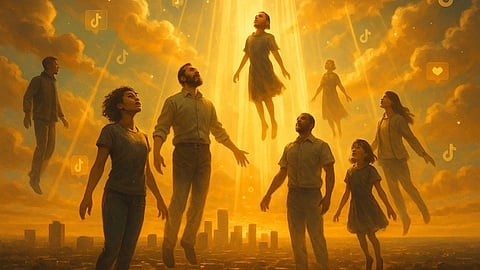
- Home
- NewsGram USA
- India
- न्यूजग्राम
- World
- Politics
- Entertainment
- Culture
- Lifestyle
- Economy
- Sports
- Sp. Coverage
- Misc.
- NewsGram Exclusive
- Jobs / Internships

South African pastor Joshua Mhlakela predicted the Rapture on September 23–24, 2025, sparking viral reactions on TikTok under #RaptureTok.
The Rapture is a Christian belief where followers of Jesus are “caught up” to meet Him, though its timing is unknown.
Previous predictions have failed, but social media has turned the topic into a global mix of faith, curiosity, and humour.
Social media has been buzzing with discussions related to the Rapture this week after a South African pastor, Joshua Mhlakela, predicted it. Pastor Mhlakela earlier claimed that Jesus came in his dream and told him that He would be coming soon. He further said that the Rapture will occur on 23rd and 24th September 2025.
The prediction quickly went viral on TikTok, sparking everything from moving videos of believers getting ready spiritually for the Rapture to light-hearted memes asking, “Will my dog be raptured too?” Many people have found resonance with the prophecy, blending faith, fear, and humour to create the rapidly spreading discussion online in recent weeks.
With all the talk about the Rapture, now the question arises as to what exactly the Rapture is and why it is talked about so much. It is a Christian belief that followers of Jesus will be “caught up” to meet Him in the air when the time comes. The word “Rapture” originates from the Latin word “rapturo,” which is a translation of the Greek word “harpazo,” meaning “to snatch away.”
The idea is a mystery because no one knows when or how it will occur, but it also promises salvation from all of the world's problems. Some believe that the gathering of believers and Christ’s Second Coming are the same, while others see them as separate events, occurring before a period of severe adversity on Earth.
There have always been predictions about the Rapture despite its mystery, with history filled with bold claims and missed deadlines. There is the case of Edgar C. Whisenant, who published 88 Reasons Why the Rapture Will Be in 1988, but the year passed without any event. A South Korean religious group known as Dami Mission also announced it would occur on 28th October 1992, which was later proved wrong. The late American preacher and radio host, Harold Camping, also convinced thousands of people that Judgment Day was set for May 21, 2011, followed by the end of the world in October of the same year. Many of his followers were left devastated, both financially and emotionally, when none of it happened.
The fascination still lingers, and amidst all this, the discussion has now spread to digital platforms in 2025. The pastor's prophecy has become a viral trend on TikTok trending by the hashtag #RaptureTok. There have been thousands of videos regarding the Rapture, some filled with humour while others sharing heartfelt accounts of dreams and visions. The discussion and whispers of churches or religious pamphlets have now been replaced by a global social media spectacle.
These debates have been further fueled by the most frequently quoted passages in Christian scripture. 1 Thessalonians 4:16-17 states, “The dead in Christ will rise first. Then we who are alive, who are left, will be caught up together with them in the clouds to meet the Lord in the air, and so we will always be with the Lord,” pointing towards something similar to the Rapture. However, Jesus Himself also said in Matthew 24:36, “But no one knows about that day or hour, not even the angels in heaven, nor the Son, but only the Father.” This has been cited to suggest that predictions about the Rapture may contradict the words of Jesus."
The Rapture, however, continues to hover between fascination and faith. Some take it as a warning that time is short, while for others, it is simply an example of a prophecy blending with online culture. The prophesied days of 23rd and 24th September may or may not pass quietly, but it certainly highlights human nature: the desire to know the future and the tendency to turn it into viral online moments, often amusing. [Rh/SY]
Suggested Reading:
